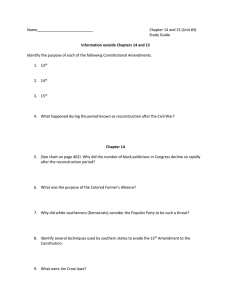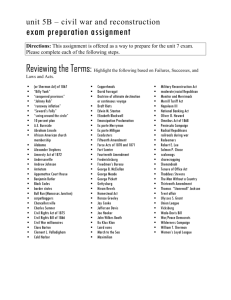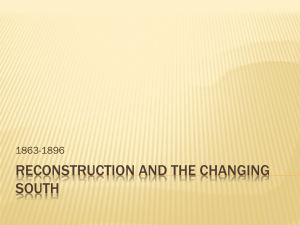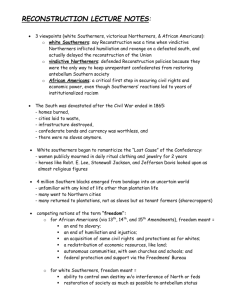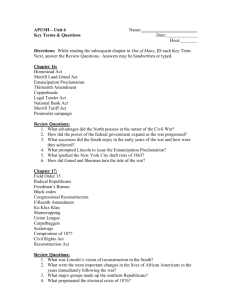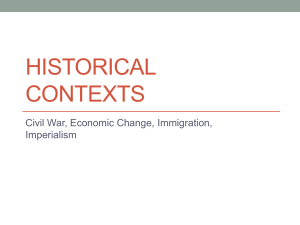17.037/17.038 American Political Thought Spring 2004 4/6/04 Student Lecture Notes
advertisement
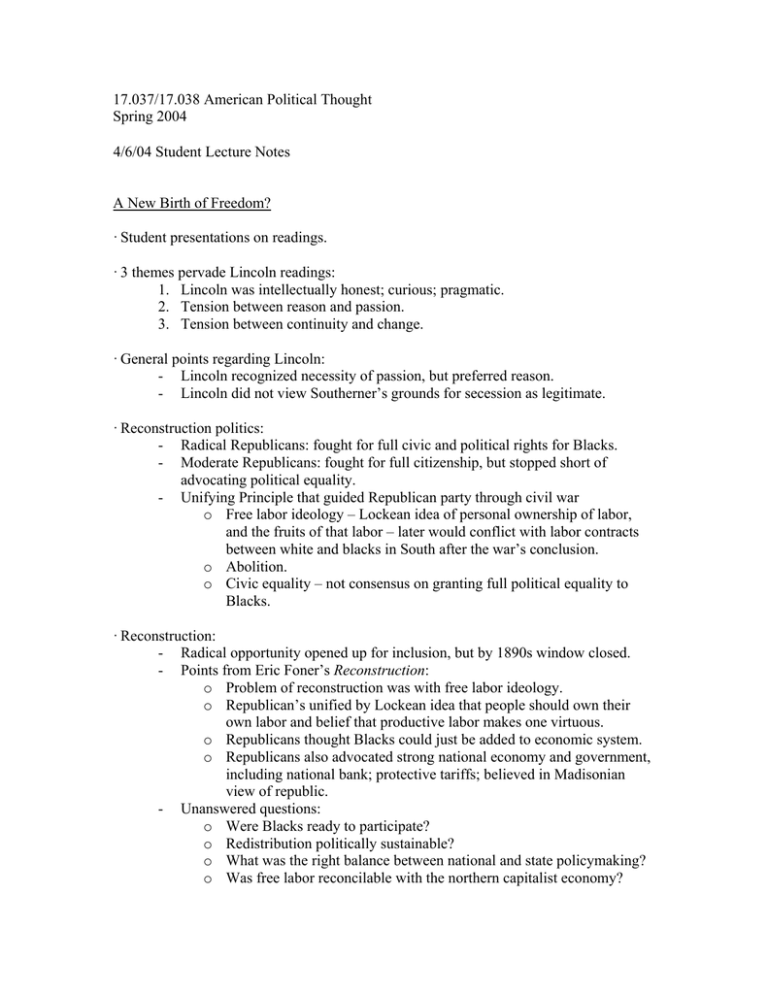
17.037/17.038 American Political Thought Spring 2004 4/6/04 Student Lecture Notes A New Birth of Freedom? · Student presentations on readings. · 3 themes pervade Lincoln readings: 1. Lincoln was intellectually honest; curious; pragmatic. 2. Tension between reason and passion. 3. Tension between continuity and change. · General points regarding Lincoln: - Lincoln recognized necessity of passion, but preferred reason. - Lincoln did not view Southerner’s grounds for secession as legitimate. · Reconstruction politics: - Radical Republicans: fought for full civic and political rights for Blacks. - Moderate Republicans: fought for full citizenship, but stopped short of advocating political equality. - Unifying Principle that guided Republican party through civil war o Free labor ideology – Lockean idea of personal ownership of labor, and the fruits of that labor – later would conflict with labor contracts between white and blacks in South after the war’s conclusion. o Abolition. o Civic equality – not consensus on granting full political equality to Blacks. · Reconstruction: - Radical opportunity opened up for inclusion, but by 1890s window closed. - Points from Eric Foner’s Reconstruction: o Problem of reconstruction was with free labor ideology. o Republican’s unified by Lockean idea that people should own their own labor and belief that productive labor makes one virtuous. o Republicans thought Blacks could just be added to economic system. o Republicans also advocated strong national economy and government, including national bank; protective tariffs; believed in Madisonian view of republic. - Unanswered questions: o Were Blacks ready to participate? o Redistribution politically sustainable? o What was the right balance between national and state policymaking? o Was free labor reconcilable with the northern capitalist economy? - - - Major accomplishments of early Reconstruction (1866-1876) o Emancipation. o Black suffrage, basic civil and political rights. o 13th-15th Amendments to Constitution. o 6 major statutes, including 4 civil rights bills. Anti-Reconstruction forces: o Southern sympathizers in the North. o President Johnson. o Most white southerners. o States’ rights advocates. Reasons for failure of Reconstruction: o Class conflict. o Racism prevented alliance between black and white laborers. o Economic system did not change in South; Foner argues that Reconstructionists did not think about necessary economic underpinnings of equality; free labor emphasis on individual not conducive to economic opportunity for Blacks. o Doctrine of states’ rights. · Myra Bradwell v. Illinois (1873) - Bradwell’s lawyer based argument on privileges and immunities clause of 14th Amendment; argued for broad reading; this clause was written with focus on rights and opportunities for Blacks but later extended to other groups, including women. - At time, state courts used privileges and immunities clause to extend rights to women, including Illinois which enacted law allowing women to enter bar after this case. - Supreme Court: decided that allowing women into bar in Illinois was up to state; right to practice law should be determined by states and was not dependent on U.S. citizenship. · Stantion: - Arguments for women’s suffrage shifted from inclusive to exclusive and ascriptive – upset that Black males enfranchised before White, Anglo-Saxon women - Broke with antislavery movement; afterwards fought for women’s political rights exclusively. - Stanton felt betrayed by abolitionists who supported suffrage for black males, and not for women. 2
